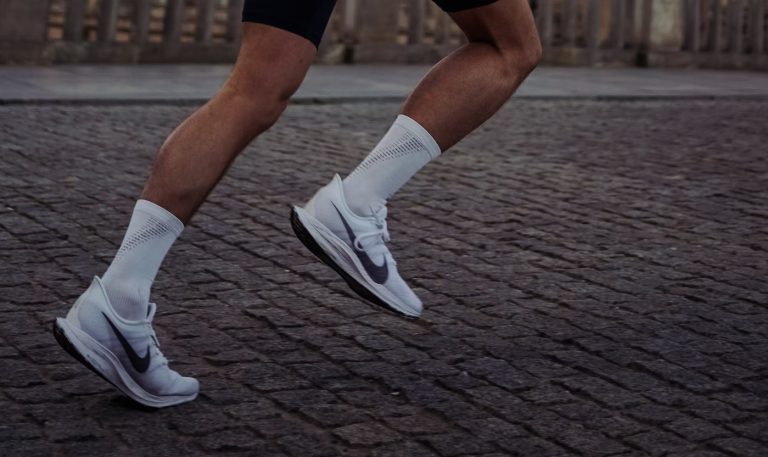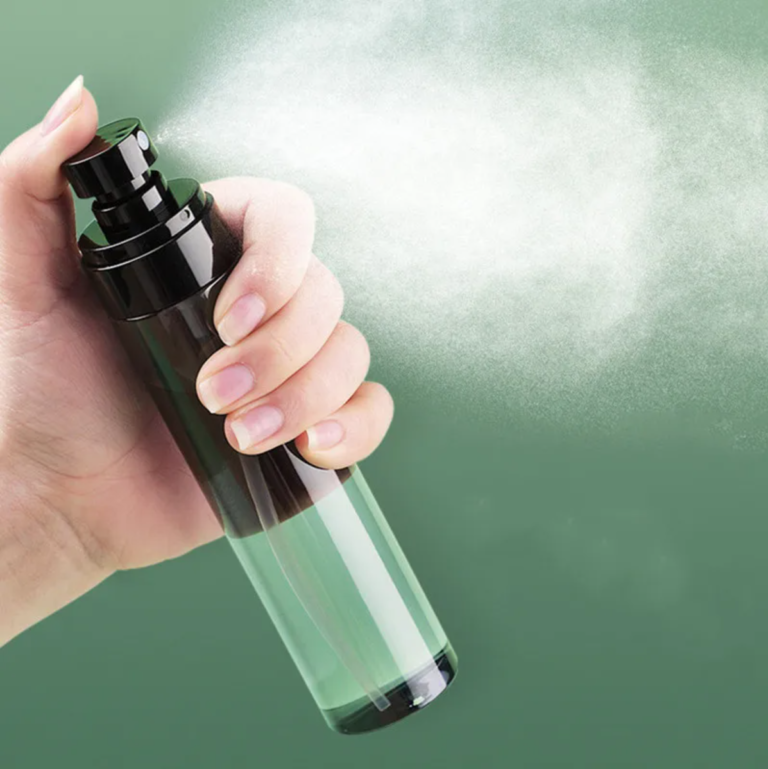Top 10 Best Insoles for Combat Boots – A Comprehensive Review
Have you ever laced up your combat boots, ready for a tough day, and felt foot pain? For those in the military, foot soreness is more than just annoying. It can stop you from doing your job right. If you’ve felt this way after a long day on patrol or a tough march, you understand how crucial foot support is.
Standard military boots are tough, but they often lack comfort. A top-notch insole turns these sturdy boots into a support and cushioning haven. If you want to relieve foot pain or just upgrade your boot support, our review has you covered.
We’ve gathered the ten best insoles for combat boots. They offer top-notch foot pain relief, arch support, and cushioning for long hours on duty. These insoles are key for those wearing military boots regularly. They make sure your mission focus isn’t shaken by foot discomfort.
Get ready to see how the perfect insole changes everything for the better. It will give you the comfort and support you need. Your feet will feel great, and your performance will improve.
Key Takeaways
- The right insole can significantly alleviate foot pain and enhance comfort in combat boots.
- Quality insoles provide essential cushioning and proper support, crucial for military personnel.
- A good insole not only helps with immediate pain relief but also prevents future foot ailments.
- Investing in the best insoles for military boots is vital for long-term foot health and overall performance.
- Discover our top ten recommendations and find the perfect insole for your needs.
Introduction
Whether you’re in the military, law enforcement, or you just love the rugged style, combat boots are an essential part of your gear. However, without the right insoles, those boots could cause pain and discomfort. We’ve put together a list of the 10 best insoles for combat boots, specifically designed to alleviate common pain points. These options have been carefully selected for their key features designed to address usual concerns.

Problems with Standard Combat Boot Insoles
Combat boots are designed for durability and protection, not comfort. The standard insoles that come with combat boots often cause problems:
- Thin padding – Combat boot insoles are usually just 1/8-inch foam or thin cushioning. This minimal padding allows you to feel every rock and uneven surface under your feet.
- Hard material – Manufacturers choose firm rubber or stiff foam for the insole to hold up to abuse. But the unforgiving texture offers no cushion or support.
- Lack of support – With a flat shape and no arch or heel support, standard insoles strain your feet. This can lead to arch pain, heel pain, and plantar fasciitis.
- Causes foot pain – Thin, hard insoles make your feet ache and get sore quickly. Long hikes or patrols in standard insoles can cause blisters, numbness, and fatigue.
- Contributes to knee/back issues – Poor cushioning and lack of support throws your body alignment off. This stresses your knees, hips, and lower back. You may experience knee pain, IT band syndrome, and sciatica.
| Issue | Impact |
|---|---|
| Thin Cushioning | Leads to foot fatigue |
| Firm Materials | Causes foot pain and inadequate shock absorption |
| Flat Design | Contributes to arch pain and plantar fasciitis |
| Overall Poor Support | Affects overall mobility and comfort |
The standard insoles in combat boots provide zero comfort. Replacing them with good aftermarket insoles makes a huge difference for proper foot support and pain relief.
Benefits of Replacement Combat Boot Insoles
Replacing the standard insoles in combat boots with aftermarket insoles offers many benefits for comfort and foot health.

Cushioning
Aftermarket insoles provide extra cushioning under the foot. This helps absorb impact while walking, running, and jumping, reducing stress on feet, ankles, knees and hips. The added cushioning also helps prevent pain and injuries associated with impact. Many aftermarket insoles use advanced foam cushioning that is more shock-absorbent than the standard thin insoles.
Arch Support
Most aftermarket insoles are contoured to better support the arches of the feet. Standard combat boot insoles are flat and don’t adequately support arch height. Good arch support helps align the feet and distribute weight evenly. This can relieve pain caused by flat feet or high arches. Arch support is especially important for combat boots, which are not designed for customized arch support.
Shock Absorption
Quality aftermarket insoles excel at absorbing shock and impact. This is important for high-impact activities commonly done in combat boots, like marching, running, and jumping. Aftermarket insoles reduce impact on feet, legs and back compared to standard insoles. Their shock-absorption protects from injuries and reduces foot fatigue.
Reduced Foot Fatigue
The cushioning and arch support of aftermarket insoles reduce foot fatigue. Standard combat boot insoles provide minimal padding and support. Aftermarket insoles better distribute weight and reduce pressure points, keeping feet comfortable for longer. This helps users avoid foot pain, cramps and fatigue when wearing combat boots all day.
Prevent Injuries
Aftermarket insoles can help prevent many common injuries associated with combat boots. These injuries include plantar fasciitis, shin splints, knee pain, back pain, and foot and ankle sprains. Their shock absorption and arch support take pressure off injury-prone areas. Replacing thin standard insoles reduces risk of these chronic injuries.
| Feature | Benefit |
|---|---|
| Cushioning | Enhanced comfort and pressure distribution |
| Arch Support | Prevents plantar fasciitis and maintains natural foot alignment |
| Shock Absorption | Mitigates stress and impact on feet and joints |
| Reduced Foot Fatigue | Enhances endurance during prolonged wear |
| Prevent Injuries | Reduces risk of common injuries like shin splints and stress fractures |
Key Considerations for Combat Boot Insoles
When choosing replacement insoles for combat boots, there are several key factors to consider:

Cushioning
Cushioning is crucial for shock absorption and impact protection. Look for insoles made of materials like memory foam or EVA foam that compress under pressure to absorb shock. Cushioning also helps reduce foot fatigue. Focus on insoles with thicker cushioning under the heel and forefoot where you need it most.
Shape/Fit
The insole should fit the exact contours of your foot for optimal comfort and support. Custom-molded insoles provide the best fit. But there are also heat-moldable insoles that you can customize at home to mold to your feet. Ensure there is no sliding or rubbing which can cause blisters.
Durability
Combat boots undergo tough conditions, so the insole needs to be extremely durable. The materials should resist compression and retain cushioning even under heavy use. Replace insoles once they become overly compressed or worn out.
Moisture Wicking
Insoles that wick moisture are essential to keeping feet dry and blister-free. Look for insoles with moisture-wicking fabrics like wool, bamboo charcoal, or open cell foam that draw sweat away from the foot. Some also have anti-microbial treatments to prevent odors.
Antimicrobial
Antimicrobial properties help combat bacteria and fungus that causes foot odor, infections, and athletes foot. Silver is a powerful antimicrobial that is added to many insoles. Also look for insoles treated with antimicrobial chemicals like Microban.
| Key Consideration | Description | Benefit |
|---|---|---|
| Cushioning | Provides comfort and absorbs shock. | Reduces foot fatigue and alleviates pressure points. |
| Shape/Fit | Contours to the foot’s natural shape and arch type. | Ensures maximum support and prevents blisters. |
| Durability | Withstands intense environments and prolonged use. | Offers long-lasting support and cushioning. |
| Moisture Wicking | Manages sweat and keeps feet dry. | Prevents blisters and discomfort from foot dampness. |
| Antimicrobial | Maintains hygiene and prevents odor. | Keeps feet fresh and clean, reducing microbial growth. |
10 Best Insoles for Combat Boots
Combat boots put your feet through a lot of stress with all the marching, running, and hauling heavy loads. Having proper insoles is crucial for providing arch support, shock absorption, and stability. After researching the top-rated and recommended insoles for combat boots, here are 5 of the best options:
1.RoamingFeet Orthotic Insoles
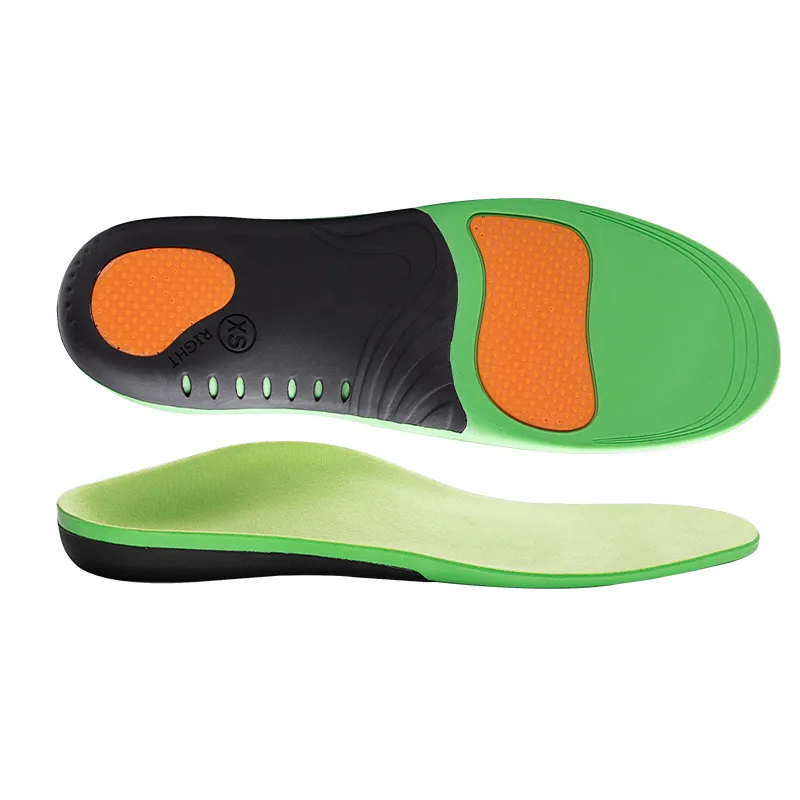
The Roamingfeet insoles are consistently one of the top-rated insoles for combat boots. They have a profiled design that provides structure and stability. The deep heel cup helps stabilize the foot and prevent sliding. The insoles are made of durable materials yet have a comfortable foam layer for cushioning. The Roamingfeet orthotic insoles work well for many foot shapes and types.
Pros
High arch support for improved comfort
Deep heel cup for excellent shock absorption
Durable construction ensures long-lasting use
Cons
Premium price point
Some users may find the high arch uncomfortable
2.Dr. Scholl’s Heavy Duty Support Insoles
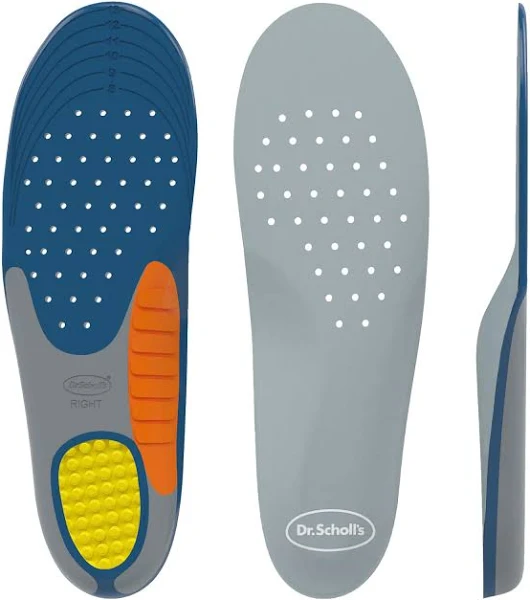
Dr. Scholl’s Heavy Duty Support insoles provide excellent shock absorption and cushioning. They have a thick foam base layer topped with gel pads in the heel and forefoot to reduce pressure. Reinforced arch support helps prevent fatigue. These insoles are on the bulkier side but can make boots much more comfortable for all-day wear.
Pros
Clinically proven pain relief
Reduces foot and lower back pain
Excellent arch support
Cons
May not be as durable as other options
Cushioning may lose effectiveness over time
3.Powerstep Pinnacle Insoles
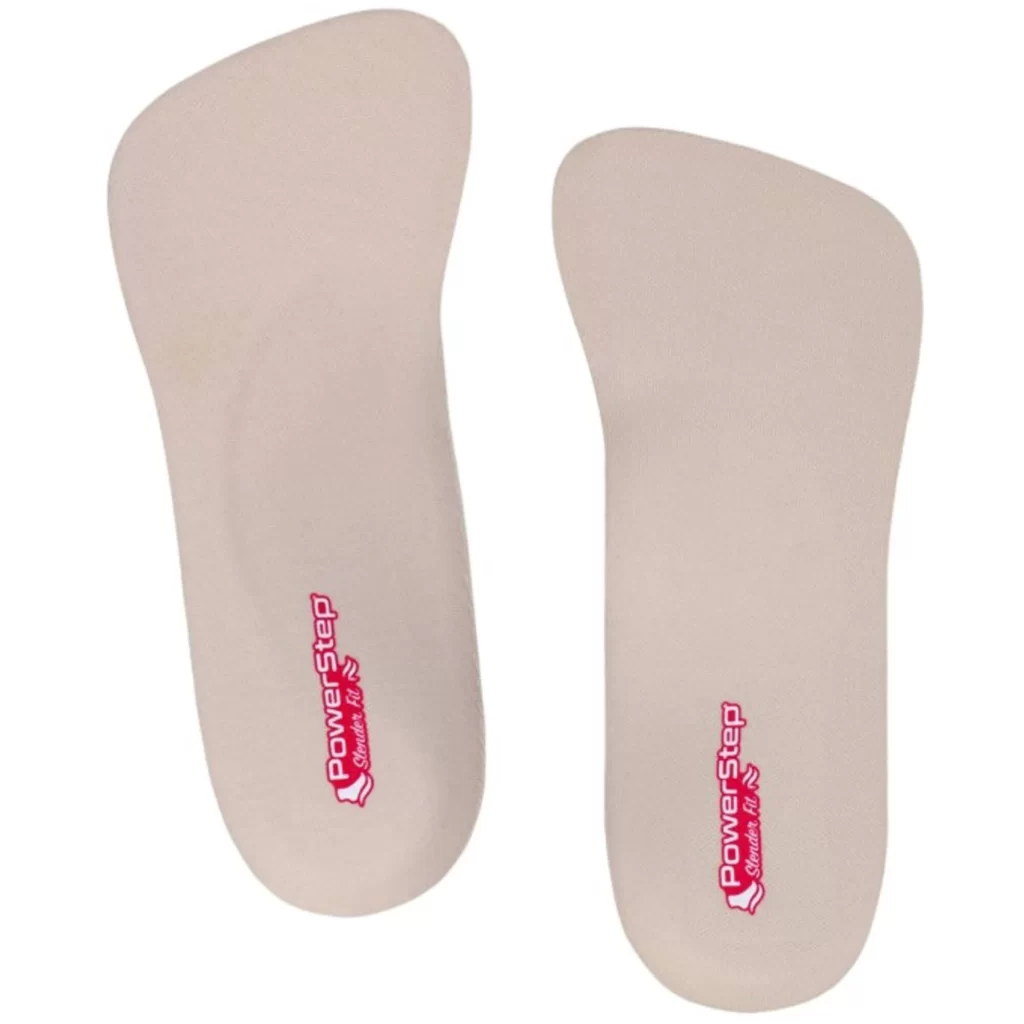
The Powerstep Pinnacle insoles have a semi-rigid arch support to prevent pronation. This helps realign the foot into proper position. The deep heel cradle provides stability and the double layer cushioning absorbs shock. These insoles work very well for flat feet or fallen arches. The antimicrobial top cover reduces odors.
Pros
Angled platform for excellent overpronation control
Durable, medical-grade construction
Arch support and deep heel cradle stabilization
Cons
Might require a break-in period
Not suitable for people with low arches
4.Timberland PRO Anti-Fatigue Insoles
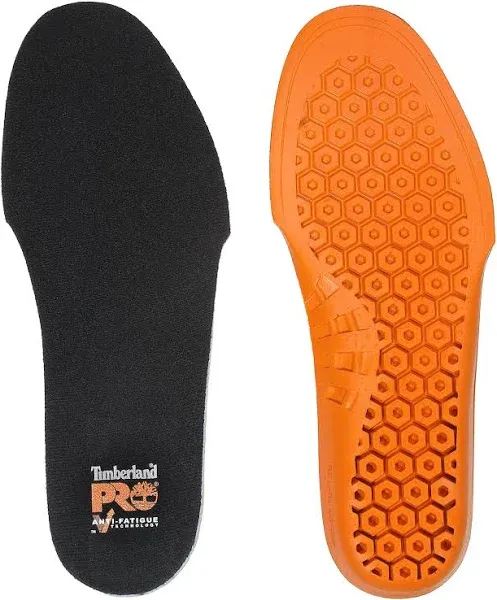
Designed specifically for work boots, the Timberland PRO Anti-Fatigue insoles provide arch support and shock absorption. The polyurethane construction is durable enough for heavy use. The unique inverted cone design under the heel absorbs shock and returns energy. These insoles are also antimicrobial and help reduce foot fatigue.
Pros
Inversion technology targets key pressure areas
Resilient cushioning for all-day comfort
Antimicrobial and moisture-wicking properties
Cons
May be bulky for some boots
Cushioning might compress over time
5.Sof Sole Athletic Cushion Insoles
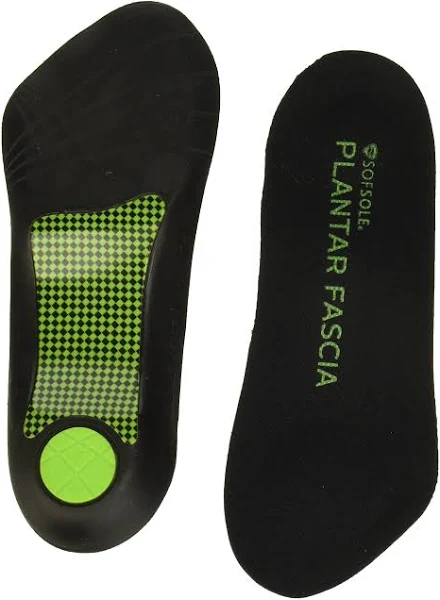
The Sof Sole Athletic Cushion insoles provide a shock absorbing base along with air bubbles in the heel and forefoot. This provides a comfortable, cushioned feel during wear. The moisture-control top cover reduces odors and friction. While on the thinner side, these insoles can make rigid combat boots more comfortable.
Pros
Air cushioning for shock absorption
Cooling technology for breathability
Gel padding in the heel and forefoot
Cons
May not provide sufficient arch support for some
Cushioning may break down over time
6.Heavy Duty Support Pain Relief Insoles
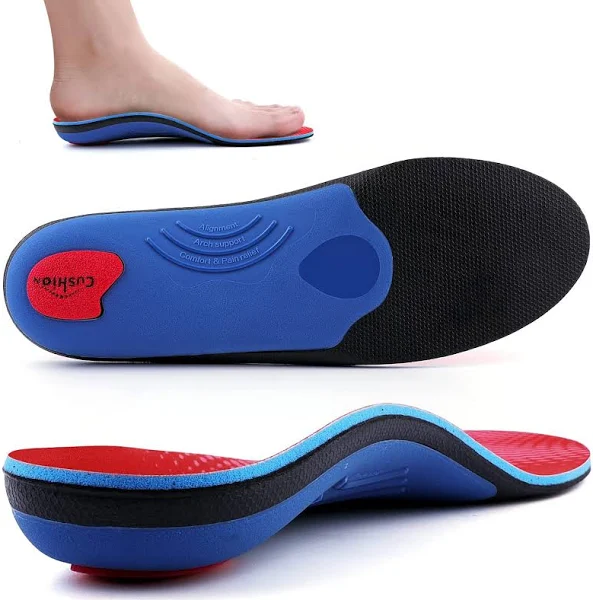
These Heavy Duty Support insoles offer robust support and durability for plantar fasciitis, flat feet, and overpronation issues. However, the bulky design may not fit all boots, and their firmness might be too intense for some users.
Pros
Maximum support for various foot conditions
Firm arch support
Durable construction
Cons
Can be too firm for some users
Bulky design may not fit all boots
7.Keen Utility K-20 Cushion Insole
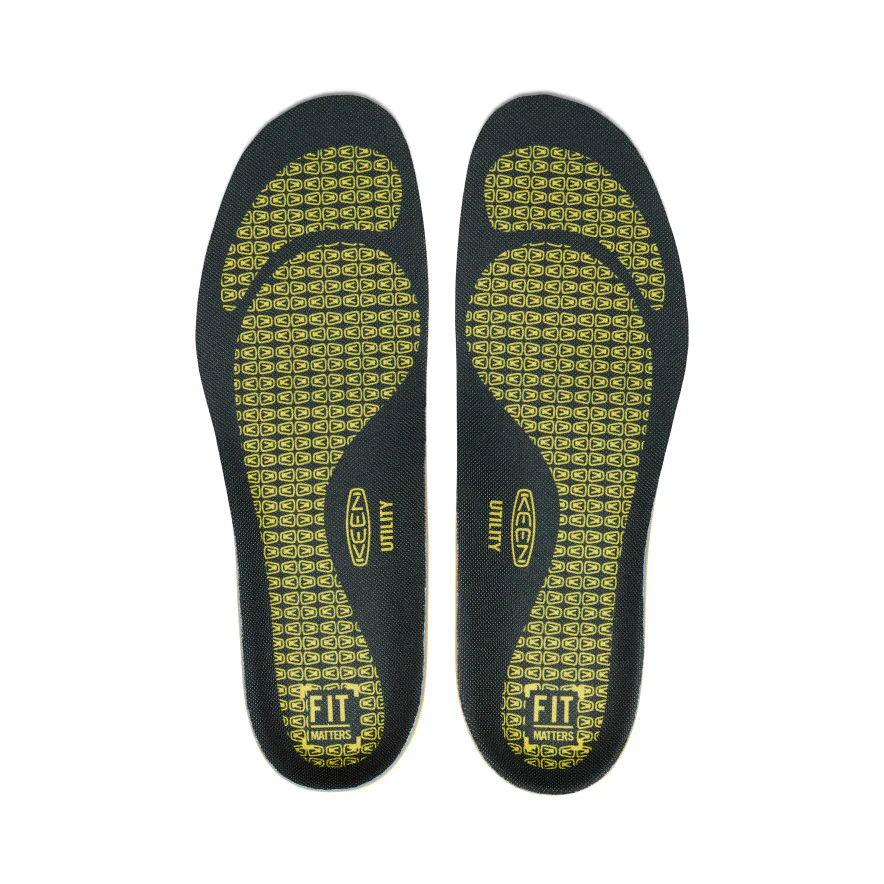
The Keen Utility K-20 Cushion Insole provides superior comfort, durability, and heel cushioning for long-lasting support. Its antibacterial properties minimize odor, but the thickness and arch support might not be suitable for all users.
Pros
Heel cushioning for enhanced comfort
Durable arch support
Antibacterial properties
Cons
May be too thick for some boots
Arch support might not suit everyone
8. Walk Hero Plantar Fasciitis Arch Support Insoles
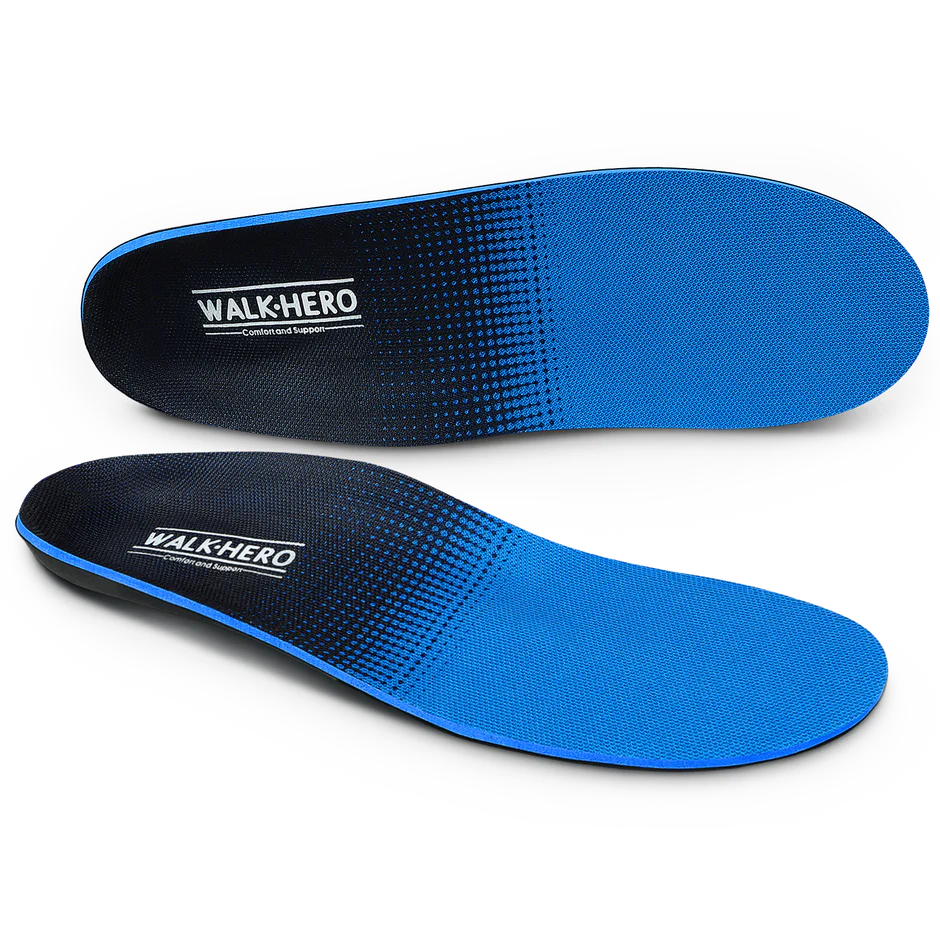
These insoles target issues like flat feet, arch issues, and plantar fasciitis by utilizing strong arch support. Despite their effectiveness, some users might find them stiff and require a break-in period.
Pros
Robust arch support
Excellent pain relief
Durable construction
Cons
Might be too stiff for some users
Requires a break-in period
If flat foot-related stress, arch issues or plantar fasciitis trouble you, consider these insoles. They firmly provide robust arch support, helping alleviate these problems.
9.PCSsole Orthotic Arch Support Shoe Inserts
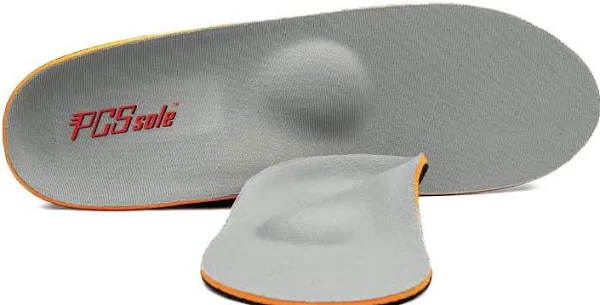
The PCSsole Orthotic Arch Support Shoe Inserts are designed to correct walking patterns and enhance foot stability. However, the thickness of the insoles might not be suitable for all users, particularly those with high arches.
Pros
Corrects walking patterns
Improves stabilization
Durable
Cons
Might be too thick for some boots
Can be uncomfortable for those with high arches
PCSsole supports biomechanical alignment. It enhances stability and corrects walking patterns. This helps those facing foot instability and alignment complications.
10.Valsole Plantar Fasciitis Insoles
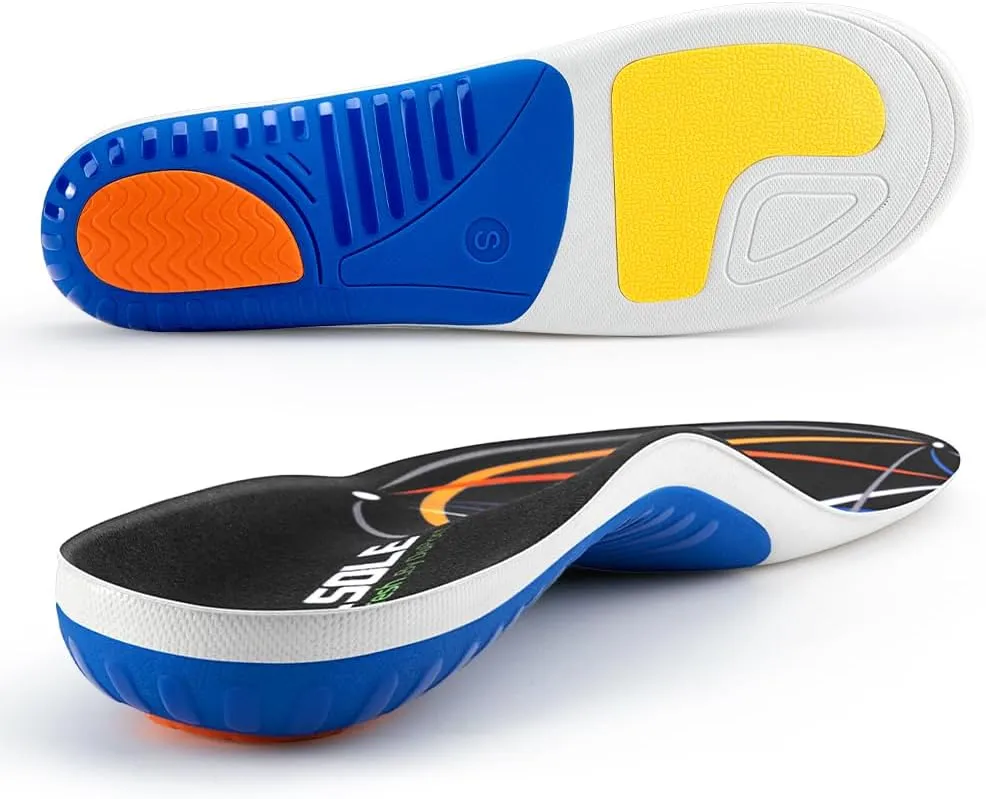
Valsole Insoles target excessive pronation and other foot conditions with their strong high-arch support. They ensure comfort and durability, but some users might find them too stiff initially.
Pros
Superior high-arch support
Good for various foot conditions
Durable construction
Cons
Can be stiff for some users
Might require a break-in period
| Insole Brand | Key Feature | Best For |
|---|---|---|
| RoamingFeet | Optimal Arch Support | Extended Wear |
| Dr. Scholl’s | Heavy Duty Support | High Foot Strain |
| Powerstep Pinnacle | Dual-layer Cushioning | Plantar Fasciitis |
| Timberland PRO | Anti-Fatigue Technology | Intense Operations |
| Sof Sole | Moisture-wicking Properties | Prolonged Use |
| Heavy Duty Support | Pain Relief | Prolonged Standing |
| Keen Utility | Dynamic Arch Design | Extended Wear |
| Walk Hero | Plantar Fasciitis Relief | Pain Alleviation |
| PCSsole | Pressure Distribution | Foot Ailments |
| Valsole | Ergonomic Design | Foot Health |
Any of these top-rated insoles can make a big difference in boot comfort and support. Consider your specific foot type, arch type, and activities to choose the best option. It’s recommended to replace the standard insoles in combat boots with more supportive aftermarket insoles. Don’t put up with foot pain – proper insoles can help you get through long marches or duty days with less fatigue.
Tips for Breaking in New Insoles
Replacing the factory insoles in your combat boots can sometimes lead to blisters and discomfort as you break in the new insoles. Here are some tips to help ease the transition:
- Wear for short periods at first – Don’t go for a 10 mile hike right after putting new insoles in your boots. Wear the boots with new insoles for an hour or two around the house for the first few days. Slowly increase the amount of time you wear them as they start to conform to your feet.
- Use a shoe stretcher – You can stretch out the boot itself to make more room for the new insole using a shoe stretcher. Place the shoe stretcher inside the boot overnight to gently stretch it out.
- Try different lacing techniques – The way you lace up your boots can make a difference in comfort. Try lacing techniques like the heel lock or lace locking to create more space in different parts of the boot and prevent pressure points.
- Use molefoam/bandages if needed – If a certain spot is leading to blisters or pain, put some molefoam or soft gel bandages on the problem areas while breaking in the insoles. This can prevent blisters from forming until the insoles conform.
Taking it slowly and making adjustments during the break-in process can help new insoles become comfortable more quickly. Don’t try to tough it out if they are causing pain – listen to your feet and make changes to the insoles or boots to reduce pressure and friction. With some patience, your feet and new insoles will get along just fine.
Caring for Your Insoles
Taking care of your insoles is essential to getting the most life out of them and keeping your feet happy and healthy in your combat boots. Here are some tips for caring for your replacement insoles:
- Remove and air out after each use – Take out the insoles after wearing your boots and allow them to completely air out before wearing again. This helps prevent bacteria growth and odor buildup.
- Wash periodically – About once a month, wash your insoles with mild soap and water. Allow them to fully dry before putting them back in your boots. This keeps them fresh and clean.
- Avoid extremes of heat or cold – Don’t leave your insoles sitting in excessive heat or freezing cold, such as in a hot car or freezing temperatures. The adhesives can break down.
- Replace when worn out – Look for signs of wearing down like compressed cushioning, torn top cloth, or cracked edges. Replace insoles once or twice a year depending on wear. Worn out insoles lose shock absorption.
Proper care will maximize the comfort and support of your insoles. By airing, washing, and replacing them when necessary, you’ll get the full benefits of upgraded insoles in your combat boots.
When to See a Podiatrist
It’s tough to deal with ongoing foot pain, especially when it hinders your daily life. If you find yourself battling foot ailments despite remedies like insoles, it may be time to visit a podiatrist. A podiatrist is an expert in foot, ankle, and lower limb health.
If you have pain that standard solutions don’t help, a visit to a podiatrist is wise. This is also true for issues like swelling, odd redness, or strong discomfort. These could point to serious problems needing professional check-up.
Specially, if you have diabetes or arthritis, which can make foot problems worse, a podiatrist visit is crucial. They may suggest custom-fit orthotics. This is also valuable for issues like flat feet or high arches, needing expert care and custom solutions.
Here’s a quick look at when to see a podiatrist:
| Condition | When to See a Podiatrist |
|---|---|
| Persistent Pain | Does not improve with over-the-counter solutions |
| Swelling and Redness | Frequent or severe occurrences |
| Chronic Conditions (e.g., diabetes) | Increased risk of foot complications |
| Structural Issues (e.g., flat feet) | Require custom orthotics for effective management |
A timely visit to a podiatrist can stop small issues from getting worse. This helps keep your life moving smoothly. For all foot health worries, don’t wait to reach out to a dedicated help center for personalized help.
Conclusion
Selecting the best insoles for military boots is key for comfort, performance, and health. For those in the marine corps, the right insoles are vital. They can reduce foot fatigue and lower the risk of injuries during activities like ruck marching.
Choosing the right insoles is essential, whether you’re in waterproof boots or trainers. Brands like Spenco and Superfeet have insoles that fit various needs. They provide everything from more cushioning to better arch support. Using a store locator can help you find the best options, matching your specific needs.
In short, the right insoles greatly improve comfort in combat boots. They help with performance and well-being over long periods. Whether you’re preparing for duty or just seeking more comfort daily, fitting insoles are a smart investment. They offer protection, lasting wear, and better foot health.
FAQ
What are the best insoles for military boots?
Some top insoles for military boots are RoamingFeet Orthotic, Dr. Scholl’s Heavy Duty Support, and Powerstep Pinnacle. They offer great cushioning, arch support, and shock absorption.
Why should I replace the standard insoles in my combat boots?
The standard insoles in combat boots lack good cushioning and arch support. This can cause foot pain and fatigue. By using quality insoles, you can boost comfort and foot health.
How do replacement insoles benefit my feet?
Replacement insoles add more cushioning, better arch support, and absorb shock well. They lower foot fatigue and decrease injury chances during tough activities like ruck marches and runs.
What factors should I consider when selecting insoles for combat boots?
Think about the cushioning, fit, and shape of the insole, and its durability. Also, consider if they keep moisture away and prevent odors to maintain foot health.
How do I break in new insoles for my combat boots?
Wear new insoles gradually to break them in. Begin by wearing them a few hours daily. Then, slowly increase the time for a comfy adjustment.
How should I care for my insoles to extend their life?
Clean insoles with mild soap and water and let them air dry. Storing them properly and using multiple pairs extends their life.
When should I see a podiatrist for foot pain despite using quality insoles?
If foot pain persists with quality insoles, it’s time to see a podiatrist. They can check your feet and suggest custom solutions if needed.
Are there insoles specifically designed for those with flat feet or high arches?
Many insoles are made for different arch types. Rigid insoles offer support for flat feet, while cushioned insoles help high arches by providing comfort and support.
How do I know if my combat boots need new insoles?
Look out for ongoing foot pain, worn material, and less cushion and support. Inspect your insoles regularly for wear signs.
Can high-quality insoles help with foot ailments like plantar fasciitis?
Yes, good insoles for plantar fasciitis enhance arch support and cushioning. They can help reduce pain and manage the condition.





